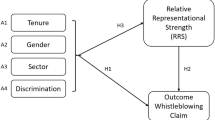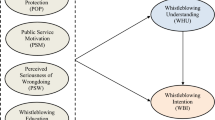Abstract
Historically, whistleblowing research has predominantly focused on psychological and organisational conditions of raising concerns about alleged wrongdoing. Today, however, policy makers increasingly start to look at institutional frameworks for protecting whistleblowers and responding to their concerns. This article focuses on the latter by exploring the roles that trade unions might adopt in order to improve responsiveness in the whistleblowing process. Research has consistently demonstrated that the two main reasons that deter people from reporting perceived wrongdoing are fear of retaliation and a belief that the wrongdoing is unlikely to be rectified. In this article, we argue that trade unions have an important part to play in dealing with both these inhibiting factors but this requires them to be appropriately engaged in the whistleblowing process and willing to take a more proactive approach to negotiations. We use Vandekerckhove’s 3-tiered whistleblowing model and Kaine’s model of union voice level to structure our speculative analysis of the various ways in which trade unions can interact with whistleblowers and organisations they raise concerns about alleged wrongdoing in, as well as agents at a regulatory level. Our articulation of specific roles trade unions can play in the whistleblowing process uses examples from the UK as to how these trade union roles are currently linked to and embedded in employment law and whistleblowing regulation.

Similar content being viewed by others
References
Addison, J. T., & Belfield, C. R. (2003). Union voice. No: IZA Discussion Paper Series. 862.
Beck, U. (1992). Risk society: Towards a new modernity. London: Sage.
Brinsfield, C. T. (2014). Employee voice and silence in organizational behaviour. In A. Wilkinson, J. Donaghey, T. Dundon, & R. B. Freeman (Eds.), Handbook of research on employee voice (pp. 114–131). Edward Elgar: Northampton, MA.
Brown, A. J. (Ed.). (2008). Whistleblowing in the Australian public sector: Enhancing the theory and practice of internal witness management in public sector organisations. Canberra: ANU E Press.
Brown, A. J., Lewis, D., Moberly, R., & Vandekerckhove, W. (Eds.). (2014). International handbook on whistleblowing research. Northampton, MA: Edward Elgar.
BSI. (2008). PAS 1998:2008 whistleblowing arrangements. Code of practice. London: British Standards Institute.
Budd, J. W. (2014). The future of employee voice. In A. Wilkinson, J. Donaghey, T. Dundon, & R. B. Freeman (Eds.), Handbook of research on employee voice (pp. 477–487). Edward Elgar: Northampton, MA.
Carr, I., & Lewis, D. (2010). Combating corruption through employment law and whistleblower protection. Industrial Law Journal, 39(1), 1–30.
CoE. (2014). Recommendation CM/Rec(2014) 7 of the Committee of Ministers to member States on the protection of whistleblowers, Adopted by the Committee of Ministers on 30 April 2014, at the 1198th meeting of the Ministers’ Deputies. Strasbourg: Council of Europe.
Detert, J. R., & Burris, E. R. (2007). Leadership behaviour and employee voice: Is the door really open? Academy of Management Journal, 50, 869–884.
Detert, J. R., & Edmondson, A. C. (2011). Implicit voice theories: taken-for-granted rules of self-censorship at work. Academy of Management Journal, 54, 461–488.
Freeman, R. B., & Medoff, J. (1984). What do unions do?. New York: Basic Books.
Frege, C., & Kelly, J. (2003). Union revitalisation strategies in comparative perspective. European Journal of Industrial Relations, 9(1), 7–24.
Hirschman, A. (1970). Exit, voice and loyalty: Responses to decline in firms, organizations, and States. Cambridge, MA: Harvard University Press.
Hyman, R. (1991). Trade Unions and the disaggregation of the working class. Management Research News, 14(10), 5–6.
Hyman, R. (2007). How can trade unions act strategically? Transfer, 13(2), 193–210.
Jubb, P. B. (1999). Whistleblowing: A restrictive definition and interpretation. Journal of Business Ethics, 41(3), 217–234.
Kaine, S. (2014). Union voice. In A. Wilkinson, J. Donaghey, T. Dundon, & R. B. Freeman (Eds.), Handbook of research on employee voice (pp. 170–187). Northampton, MA: Edward Elgar.
Katz, G., & Lenglet, M. (2010). Whistleblowing in French corporations: Anatomy of a national taboo. Philosophy of Management, 9(1), 103–122.
Lewis, D. (2006). The contents of whistleblowing/confidential reporting procedures in the UK. Some lessons from empirical research. Employee Relations, 28(1), 76–86.
Lewis, D. (2008). Ten years of public interest disclosure legislation in the UK: Are whistleblowers adequately protected? Journal of Business Ethics, 82, 497–507.
Lewis, D. (2013). Resolving whistleblowing disputes in the public interest: is tribunal adjudication the best that can be offered? Industrial Law Journal, 42(1), 35–53.
Lewis, D. (2015). Is a public interest test for workplace whistleblowing in society’s interest? International Journal of Law and Management, 57(2), 141–158.
Lewis, D., D’Angelo, A., & Clark, L. (2015). Surveys of NHS staff, trusts and stakeholders. London: Middlesex University.
Mesmer-Magnus, J. R., & Viswesvaran, C. (2005). Whistleblowing in organizations: An examination of correlates of whistleblowing intentions, actions, and retaliation. Journal of Business Ethics, 62(3), 277–297.
Miceli, M. P., Near, J. P., & Dworkin, T. M. (2008). Whistle-blowing in organizations. New York: Routledge.
Morrison, E. W. (2011). Employee voice behaviour: Integration and directions for future research. Academy of Management Annals, 5, 373–412.
Near, J. P., & Miceli, M. P. (1985). Organizational dissidence: The case of whistle-blowing. Journal of Business Ethics, 4(1), 1–16.
Near, J. P., & Miceli, M. P. (1995). Effective-whistle blowing. Academy of Management Review, 20(3), 679–708.
Near, J. P., & Miceli, M. P. (1996). Whistle-blowing: Myth and reality. Journal of Management, 22(3), 507–526.
Organ, D. (1988). A restatement of the satisfaction–performance hypothesis. Journal of Management, 14(4), 547–557.
PCaW. (2013a). Whistleblowing code of practice. London: Public Concern at Work.
PCaW. (2013b). Whistleblowing: The inside story. London: Public Concern at Work.
PCaW. (2013c). Whistleblowing commission report. London: Public Concern at Work.
Phillips, A., & Lewis, D. (2013). Whistleblowing to regulators: Are prescribed persons fit for purpose. London: Middlesex University.
Pohler, D. M., & Luchak, A. A. (2014). The missing employee in employee voice research. In A. Wilkinson, J. Donaghey, T. Dundon, & R. B. Freeman (Eds.), Handbook of research on employee voice (pp. 188–207). Northampton, MA: Edward Elgar.
Skivenes, M., & Trygstad, S. C. (2010). When whistle-blowing works: The Norwegian case. Human Relations, 63(7), 1071–1097.
Skivenes, M., & Trygstad, S. C. (2014). Wrongdoing- definition and contextual factors. In A. J. Brown, D. Lewis, R. Moberly, & W. Vandekerckhove (Eds.), International handbook on whistleblowing research (pp. 95–114). Northampton, MA: Edward Elgar.
Skivenes, M., & Trygstad, S. C. (2015). Explaining whistle blowing processes in the Norwegian labour market: Between individual power resources and institutional arrangements. Economic and Industrial Democracy. doi:10.1177/0143831X14559783.
Tsahuridu, E. E., & Vandekerckhove, W. (2008). Whistleblowing and moral autonomy in organisations. Journal of Business Ethics, 82(1), 107–118.
van Es, R., & Smit, G. (2013). Whistleblowing and media logic: A case study. Business Ethics: A European Review, 12(2), 144–150.
Vandekerckhove, W. (2006). Whistleblowing and organizational social responsibility. A global assessment. Aldershot: Ashgate.
Vandekerckhove, W. (2010). European whistleblower protection: tiers or tears? In D. Lewis (Ed.), A global approach to public interest disclosure (pp. 15–35). Northampton, MA: Edward Elgar.
Vandekerckhove, W., Brown, A. J., & Tsahuridu, E. E. (2014). Managerial responsiveness to whistleblowing: Expanding the research horizon. In A. J. Brown, D. Lewis, R. Moberly, & W. Vandekerckhove (Eds.), The international whistleblowing research handbook (pp. 298–329). Northampton, MA: Edward Elgar.
Vandekerckhove, W., & James, C. (2013). Blowing the whistle to the union: How successful is it? E-Journal of International and Comparative Labour Studies, 2(3), 66–93.
Vandekerckhove, W., & Lewis, D. (2012). The content of whistleblowing procedures: A critical review of recent official guidelines. Journal of Business Ethics, 108(2), 253–264.
Vandekerckhove, W., & Rumyantseva, N. (2014). Freedom to speak up qualitative research. London: University of Greenwich.
Vandekerckhove, W., & Tsahuridu, E. E. (2010). Risky rescues and whistleblowing. Journal of Business Ethics, 97(3), 365–380.
Author information
Authors and Affiliations
Corresponding author
Rights and permissions
About this article
Cite this article
Lewis, D., Vandekerckhove, W. Trade Unions and the Whistleblowing Process in the UK: An Opportunity for Strategic Expansion?. J Bus Ethics 148, 835–845 (2018). https://doi.org/10.1007/s10551-016-3015-z
Received:
Accepted:
Published:
Issue Date:
DOI: https://doi.org/10.1007/s10551-016-3015-z




